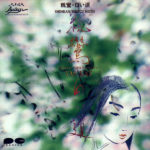
Originally recorded to soundtrack Rentarō Mikuni’s Jury Prize-winning Cannes film festival “Shinran: Path to Purity”, Yas Kaz’s own Shinran/Path To Purity does well to exist on its own, outside the cinema. Taking cues from the original story of Shinran, the Buddhist monk who promoted a very egalitarian method to spirituality/salvation, so does Yas Kaz transform his knowledge of Japanese folk tradition/instrumentation into a much headier stew of deeply affecting, modern experimental music that is as complex and colorful as it is contemplative and melancholic.

A rare return back to form, Shinran/Path To Purity takes Yas Kaz back to his lesser experienced work accompanying theater and performance groups. Being the master percussionist that he is, most of the exciting moments on the disc are when Yas Kaz’s peculiar form of timekeeping (which absconds of letting you exactly place what his chosen form of percussion is) allows other instruments to steal the scene. Violins that sound like quicksilver, floating keyboard beds, transfiguring sax and wind sounds seem to further add sheer variety to the sonic blossoming Yas Kaz choses to put you through.
Don’t let the opener “Mizugiwani Furu Yuki”, perhaps the most soundtrack-like song, throw you off the scent. When “Hourai No Sakebi”‘s pounding mallet drumming begins that’s when the album really starts to flow through what makes this such an essential listen. “Gengong” a piece led by mouth harp but mutating via droplet percussive drumming sounds and Japanese chants, are as close to works we’re used to hearing in Yas Kaz’s most known release: Jomon-Sho. Then enter tracks like “Gekichu Geki” that have more in common with the more experimental work he afforded Ryuichi Sakamoto in Esperanto and the influence of Indochinese music not often heard much elsewhere – both new, welcome, unheard of experimentations by Yas Kaz.
“Kieyuku Asiato” transports the gossamer electric violin sound of Jean-Luc Ponty into a more affecting, slithering creature, where beautiful peaks get absorbed by delay effects and chiming cymbals, shifting, transforming a yearning melody, further and further into something deeply arresting. The same can be said equally of the following two tracks “Kokyu” and “Uite Sizunde, Sizunde Uite” (my personal favorite) that use breath and vocalization as simple, powerful rhythmic beds to present even more unplaceable, circular, otherworldly mantras. “Shiroi Michi” ends the album on some atmosphere I’m still struggling to place much elsewhere. The cover of Shinran/Path To Purity is a beautiful as it is pointed in its providence – at least, for those of us who still struggle, patiently, to understand this work.
